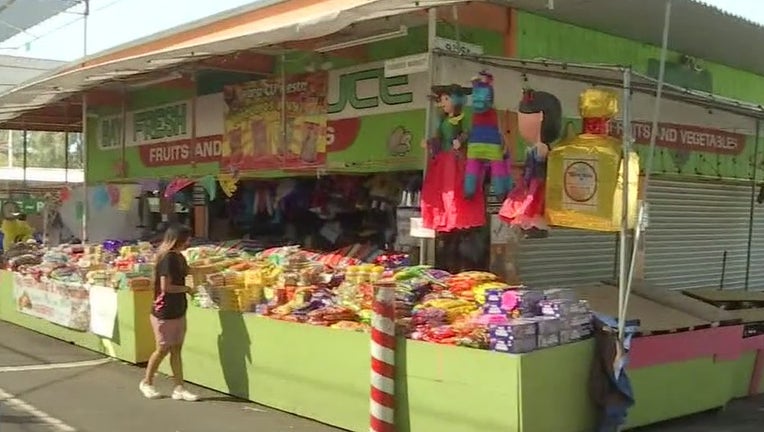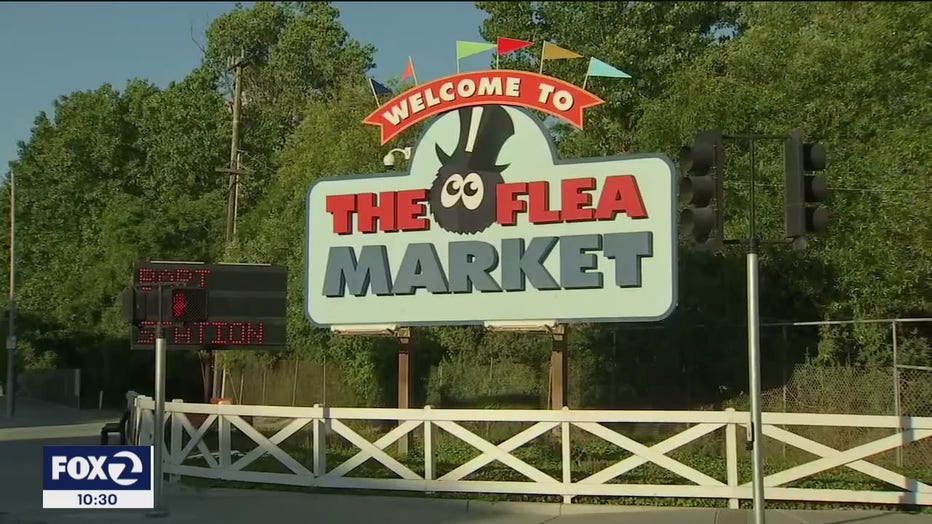San Jose City Council unanimously approve Berryessa Urban Village, shrinking flea market's size

SAN JOSE, Calif. - San Jose City Council on Tuesday unanimously voted to approve rezoning for the Berryessa BART Urban Village, city officials say.
The rezoning vote comes with a voluntary agreement from the landowners to protect vendors of the San Jose flea market, also known as La Pulga, according to a news release from District 4 Councilmember David Cohen's office.
Under this deal - the flea market will shrink by 10 acres – leaving it only one-third of its original size.
There are 430 vendors – many who fear they will be forced to leave.
Under the deal – landowners will put $5 million into a fund to help vendors relocate.
The transit-oriented mixed-use development has been in the works for 20 years, but recently left many of the vendors feeling uncertain about their future. The Urban Village includes a 3.4 million square foot plan that would create up to 3,450 homes near the new BART station.
Organized flea market vendors, who briefly went on hunger strike, are concerned the rezoning plans downsizes the flea market by two-thirds to five acres and that plans for retail and housing development will jeopardize the 430 vendors' jobs, many of which are immigrant and family-owned operators.
San Jose flea market will be reduced to a third of its original size
San Jose City Council unanimously approved the Berryessa Urban Village on Tuesday. The plans for housing and retail will reduce the historic flea market to just five acres, but an agreement is in place between the city, land owner and vendors to help with relocation and guarantees no evictions before the market closes.
Councilmembers David Cohen, Raul Peralez and Magdalena Carrasco met with vendors and Erik Schoennauer, a representative for the Bumb family, who own the parcel of land the flea market is on, last Friday in an effort to meet some of the vendor demands.
The agreement ensures there will be a continuation of the historical flea market that opened more than 60 years ago.
"No vendor will be evicted as long as they don’t violate the terms of their rental agreement. Moving forward, they would be given a total of 3 years (1 year notice, given no earlier than 2023) before the current site were to close. Existing vendors will have the option of a 6 month licensing term," the statement from Cohen's office read.
In addition, city officials say an advisory committee will be installed and comprised of flea market vendors, the landowners and city staff. The committee will determine how the funds from the transitional fund will be spent.
"This is a beginning and not an end and I'm hopeful that under the city's advisory group that we are able to really incorporate the input from the Berryesssa Flea Market Association," said city councilmember Maya Esparza.

Last week's vote on the rezoning plan was delayed as vendors and activists rallied along with holding the hunger strike, to buy more negotiating time. Vendors and their advocates say public comment was not allowed during Tuesday's vote.
Mayor Sam Liccardo also said he met with the Santa Clara Valley Transportation Authority to help identify more space to expand the flea market and accommodate more vendors.
In Liccardo's recent memo, he also requested the city to find alternatives, like using the space underneath the BART's elevated tracks on the weekends so vendors have more space and explore the possibility of using American Rescue Fund dollars, taxes from the development of the project and economic development grants to supplement the flea market vendor fund.
"There could be a substantial possibility that we could accommodate all or nearly all the vendors who want to be there, certainly on the weekend," Liccardo said.
Still, the latest agreement falls short of vendor demands, which requested $15 million and a 10-acre plot of land from the Bumb family.
The Berryessa Flea Market Vendor Association also demanded three-year leases for current vendors, that they are given the sole right to represent retailers and rights to all logos, historical records and intellectual property related to the 61-year-old market.
Those demands were not met but the Bumb family promised to not evict any vendors before the current flea market closes, to give first choice to move into the new flea market to current vendors and to offer rents comparable to other open-air markets.
"It really is my hope that these families don't continue to live paycheck to paycheck, but rather see themselves as investors in their future," said Carrasco, who represents the district where many of the vendors live. "And the Bumb family, who has been successful, teach and guide them with principles they've learned from and impart that wisdom."
Peralez said the city is "setting up the bare bones today," and Nanci Klein, the city's director of economic development assured the council that the city would reach out to vendors and include them in the planning process.
Jana Kadah with Bay City News Foundation contributed to this report.

